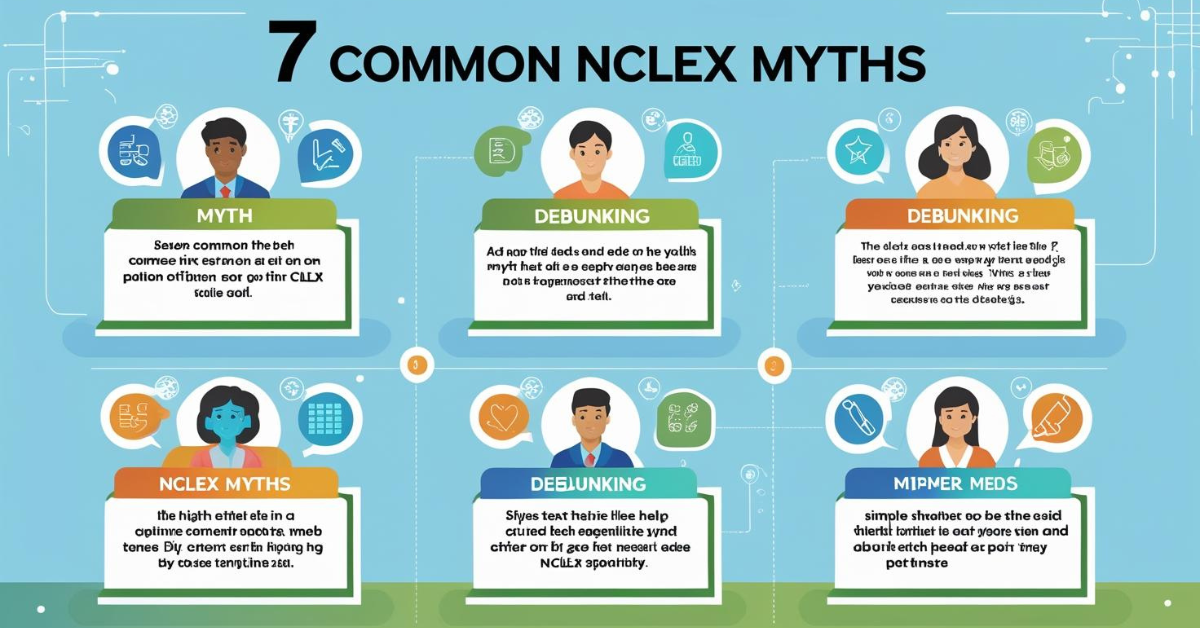The 7 Common NCLEX Myths Debunked and Explained. NCLEX scores do not expire. You do not need to practice in the United States within a specific timeframe after taking the exam.
What are 7 Common NCLEX Myths Debunked and Explained
Seven common NCLEX myths: Passing is too difficult, exam length predicts score, failing SATA questions means failing, the computer selects questions based on weaknesses, test anxiety is the leading cause of failure, each state requires registration at its respective site, and NCLEX scores expire. In fact, the NCLEX is a valid measure of nursing competency, designed to ensure security. Computer Adaptive Testing (CAT) adapts to your performance, not your weaknesses, test anxiety is manageable, and passing the NCLEX grants licensure in any state with no expiration date.
Myth 1: “Select All That Apply” Questions Are Harder
The Reality: SATA questions aren’t inherently greater hard they simply require a specific approach. Many college students panic due to the fact they cannot use system of removal the identical way. The secret is treating every alternative as a true/fake statement. Don’t overthink relationships among choices. If an intervention is suitable for the affected person, pick it out no matter what number of different alternatives you’ve chosen.
Strategy: Read every alternative independently. Ask yourself: “Is this intervention safe, suitable, and inside the scope of nursing exercise for this particular affected person situation?”
Myth 2: “The Computer Adapts, So More Difficult Questions Mean You’re Failing”
The Reality: The CAT (Computer Adaptive Testing) machine offers you tougher questions while you are answering correctly, no longer while you are failing. Receiving difficult questions frequently suggests you are acting at or above the passing standard. The machine stops trying out while it is assured approximately your competency level, whether that takes seventy-five questions or 265.
Strategy: Don’t interpret query trouble as a overall performance indicator. Focus on every query in my opinion as opposed to looking to gauge how you are doing primarily based totally on content material complexity.
Myth 3: “You Must Know Every Drug and Dosage”
The Reality: NCLEX exams nursing judgment approximately medications, now no longer pharmaceutical knowledge. You won’t see questions soliciting unique dosages or difficult to understand drug interactions. Instead, count on questions on secure management practices, affected person coaching priorities, and spotting healing as opposed to unfavorable effects.
Strategy: Focus on drug classifications, fundamental aspect effects, contraindications, and nursing issues in preference to memorizing unique doses or mechanisms of action.
Myth 4: “Assigning Questions Always Follow ABC or Maslow’s Hierarchy”
The Reality: While ABC (Airway, Breathing, and Circulation) and Maslow’s hierarchy are beneficial structures, they are no longer perfect rules. Sometimes psychosocial desires take precedence over physiological ones, specifically in psychiatric nursing scenarios. Safety usually comes first, however that would suggest addressing an affected person’s suicidal ideation earlier than their dietary desires.
Strategy: Consider the context of every question. Use ABC and Maslow as guides; however, practice crucial wondering to decide what poses the maximum instantaneous hazard to affected person protection or well-being.
Myth 5: “If You Don’t Know Content, You Can’t Pass”
The Reality: NCLEX assesses your capacity to assume like a safe, able nurse, no longer your capacity to don’t forget facts. Many questions may be responded to the use of nursing process, protection principles, and logical reasoning even supposing you`re surprising with the circumstance or medicinal drug mentioned.
Strategy: When you come across surprising content material, fall returned to essential nursing principles: protection first, affected person advocacy, healing communication, and evidence-primarily based totally exercise.
Myth 6: “The Exam Stops at seventy-five Questions Because You Either Passed or Failed Definitively”
The Reality: The pc stops at minimal length (seventy-five questions) whilst it is assured approximately your capacity level, however this can suggest passing, failing, or being very near the passing standard. Some applicants who prevent seventy-five questions fail, whilst others skip. The range of questions would not expect your outcome.
Strategy: Don’t waste intellectual electricity studying query count. Whether you get seventy-five or 200+ questions, keep conscious and solve everyone to the high-quality of your capacity.
Myth 7: “NCLEX Prep Courses Guarantee Success”
The Reality: No training approach ensures passing. While prep courses, books, and exercise assessments are treasured tools, fulfillment in the long run relies upon for your foundational nursing understanding, essential wondering skills, and test-taking strategies. Some college students skip the use of unfastened resources, whilst others fail no matter what luxurious prep programs.
Strategy: Choose training techniques that fit your mastering fashion and understanding gaps. Combine more than one resource: content material review, exercise questions, and test-taking strategies. Quality of examine subjects extra time than amount or value of materials.
The Real Truth About NCLEX Success
Success comes from information that NCLEX assesses your capacity to make safe, patient-focused choices beneath pressure. It’s designed to make certain new nurses shield sufferers from damage at the same time as supplying able care. Focus on growing medical judgment as opposed to memorizing facts and consider that the examination is trying out minimal competency—you do not want to be best to pass.
The maximum a hit applicant’s method NCLEX as an extension in their nursing education, now no longer as an impediment to overcome. They believe in their training, follow essential nursing principles, and hold self-assurance of their capacity to suppose through issues systematically.
Read More:
https://nurseseducator.com/didactic-and-dialectic-teaching-rationale-for-team-based-learning/
https://nurseseducator.com/high-fidelity-simulation-use-in-nursing-education/
First NCLEX Exam Center In Pakistan From Lahore (Mall of Lahore) to the Global Nursing
Categories of Journals: W, X, Y and Z Category Journal In Nursing Education
AI in Healthcare Content Creation: A Double-Edged Sword and Scary
Social Links:
https://www.facebook.com/nurseseducator/
https://www.instagram.com/nurseseducator/
https://www.pinterest.com/NursesEducator/
https://www.linkedin.com/in/nurseseducator/
https://www.researchgate.net/profile/Afza-Lal-Din
https://scholar.google.com/citations?hl=en&user=F0XY9vQAAAAJ



Thank you for helping out, great info. “The health of nations is more important than the wealth of nations.” by Will Durant.
Free video chat emerald chat and a convenient alternative to Omegle. Instant connections, live communication without registration, usernames, or phone numbers. Just click “Start” and meet new people from all over the world, whenever you like and whatever your mood.